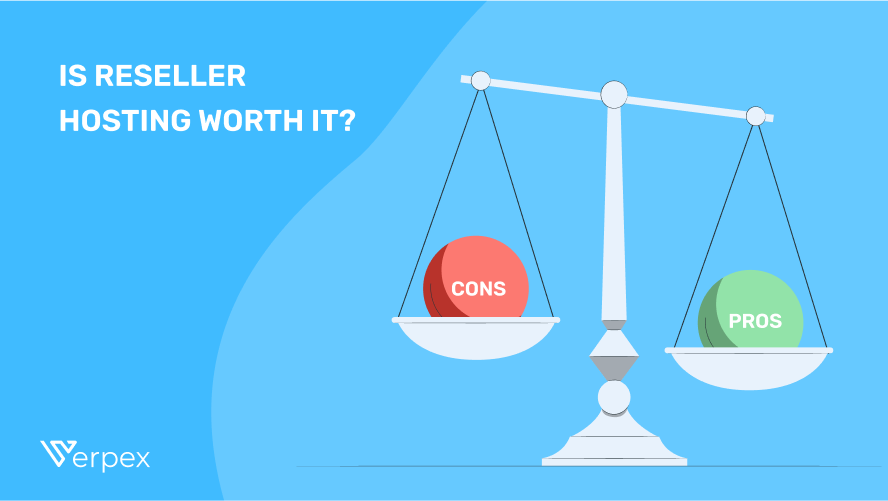Reseller hosting can be worth it for entrepreneurs seeking a flexible, scalable, and potentially profitable business opportunity, especially when they have a well-defined niche and strong customer service focus.
However, its value depends on the individual's goals, market strategy, and commitment to the business.
What is the Profit Margin for Reseller Hosting?
When considering whether reseller hosting is worth it, understanding potential profit margins can be very beneficial.
The margin of profit from reseller hosting can differ substantially, influenced by various factors. These factors may include the price point set by the hosting provider, the reseller's effectiveness in client acquisition and retention, the range of services provided, and ongoing operational expenses.A few elements that may have an impact on the reseller hosting profit margin are listed below:
• Hosting package prices: When determining the profit margin for reseller hosting, hosting package prices are a crucial consideration. Your profit margin will rise if you are able to provide trustworthy services at affordable pricing.
• Sales volume: A key element in determining the profit margin for reseller hosting is sales volume. You will be able to raise your profit margin if you can grow your consumer base.
• Service-level quality: Your profit margin will be impacted by the level of service you offer. Your client retention rate will rise if you are able to deliver dependable and high-quality services, which will boost your profit margin.
• Branding: When determining the reseller hosting profit margin, branding and reseller hosting marketing strategy are crucial elements to take into account. Gaining more clients and boosting your profit margin are both possible if you can build a strong, recognized brand.
Typically, resellers might anticipate a profit margin in the range of 15% to 50%. However, these numbers are approximations, and actual profit margins could fall above or below this range.
For instance, if a reseller procures a hosting package for $20 per month and resells it for $40 per month, they've achieved a profit margin of 50%. But if their reselling price is only $30, the profit margin falls to 33%. Conversely, if they successfully resell for $60, their profit margin surges to 67%.
However, these figures do not account for additional costs that resellers often face. These may include expenses for marketing and advertising, providing customer support, or any supplementary services the reseller might offer as part of their package.
Understanding Reseller Hosting Costs
To better understand the upfront and ongoing costs associated with reseller hosting, consider the following points:
Hosting Package Cost
This is the price you pay to the web host for the reseller hosting package. The cost can vary from a few dollars to hundreds of dollars per month, depending on the provider and the specific plan you choose.
Additional Services
The cost of additional services such as domain registration, SSL certificates, and other features should also be considered in your initial investment.
Extra Expenses Depending on the Plan
Some reseller hosting plans may come with added costs. These can include charges for bandwidth upgrades, backups, and extra storage. Additionally, some providers may charge extra for customer service or technical support.
Administration Time
The time investment required to manage the reseller hosting account is another cost to consider. This includes tasks like managing customer accounts, ensuring the hosting services are running smoothly, and providing customer support. If the workload is significant, you may need to hire additional staff.
Equipment and Software Costs
If you are offering hosting services to your customers, you might need to invest in additional hardware or software to meet their needs. This could mean purchasing more servers, storage solutions, or other tools.
Each of these points are key considerations when assessing the cost-effectiveness and profitability of a reseller hosting business.
How to Develop a Business Plan for a Reseller Hosting Company
When developing a business plan for a reseller hosting company, consider these steps:
Industry Research: Conduct thorough research on the competition and the hosting industry, including target market and potential customer analysis.
Service Offering: Understand and define the services a reseller can offer.
Initial Costs: Estimate the startup costs, including server space, web hosting, and domain name registration.
Revenue Model: Develop a comprehensive marketing and sales plan, outlining pricing strategies, potential discounts, and service tiers.
Customer Service: Define how customer service will be handled and any additional services the company might offer.
Financial Plan: Prepare a budget, revenue projections, cash flow management strategies, and cost-cutting measures.
5 Steps to Analyze Your Reseller Web Hosting Performance

Understanding how your website is performing and what needs to be changed requires analyzing the performance of your reseller web hosting. Here are the steps to analyzing your reseller web hosting performance:
Step 1. What do you hope to achieve with your website? That is the first step in choosing a web host. Know what you want to accomplish with your business and how web hosting can help you get there.
Step 2. Track vital metrics like server uptime and response times to ensure your website is performing optimally. As a result, you'll be better prepared to spot problems and implement solutions.
Step 3. Evaluate customer feedback: keep tabs on user comments on a regular basis to learn more about the user experience and how to enhance it.
Step 4. Analyze competitor pe[rformance: Monitor competitors to see how their websites are performing and what changes they have made to their web hosting strategies.
Step 5. Identify resource bottlenecks. Find the weak spots in your resources by analyzing things like your bandwidth and storage needs.
Reseller Hosting's Concepts and Functioning
Reseller hosting is when the hosting provider rents bandwidth and hard drive space to another company, which later rents the bandwidth and hardware space to third parties.
To establish reseller hosting as a service you provide, you need to research and pick the best reseller hosting parent provider. Choose a reseller package that meets your needs. Create your own branded hosting packages and decide what their price is going to be.
In order to locate your new customers, you will need to understand and know what your target market is.
Lastly, you need to sell the hosting packages to your clients and earn income from them.
The Upsides and Downsides of Reseller Hosting
Upsides
Downsides
Who Do We recommend A Reseller Hosting Business To?
A reseller hosting business is a great option for anyone who is looking to make additional income in their life.
It’s ideal if you already offer services like web design or web development because you already have an audience and potential customers for your reseller hosting packages.
What Makes A Reliable Reseller Hosting Provider?
When looking for the best reseller hosting provider, make sure you consider the following factors:

Customer support
Good hosting providers offer 24/7 support for prompt resolution of technical issues.

Backups
Check if your hosting package includes backup services; not all providers offer this.

Security
Choose security features based on your website type and needs; they can differ.

Bandwidth
Choose security features based on your website type and needs; they can differ.
Advertising Your Reseller Hosting Business
Promoting your reseller hosting company is crucial for bringing in clients. You must develop a marketing and advertising plan that will reach your target market if you want to make sure that your company stands out from the competition. This might involve building a website, advertising your products on social media, and using search engine optimization (SEO) to boost the visibility of your website. Here are some pointers for marketing your reseller hosting company:
• Building a reseller hosting website: A website is a crucial component of marketing your reseller hosting company. You will be able to exhibit your services and reach your target market thanks to this. The website may also be used to offer further details about your hosting plans and customer service.
• Social media promotion: Using social media to advertise your products and connect with potential reseller hosting customers is a successful strategy. You may advertise your services and draw new clients through websites like Twitter, Facebook, and Instagram.
• Search engine optimization (SEO): SEO is a crucial strategy for boosting the visibility of your website in search engine results. Your website's visibility in the search results may be improved by optimizing it using the appropriate terms and phrases. This will assist you draw in more clients and boost your revenue.
Is Reseller Hosting Worth It: Bottom Line
To sum it up, if you’re looking to get into the web hosting business, reseller hosting can be quite a lucrative option. However, in order to make your business successful, you will need to put in the effort and time.
Make sure that you research your reseller hosting provider and ensure you choose one that best suits your needs.
Frequently Asked Questions
What is reseller hosting?
Reseller hosting is essentially a way for you to purchase hosting resources from us in bulk and then to re-sell those resources directly to your clients. You can set limitations on disk space, bandwidth, email usage, and other features on a per-package or per-site basis. We provide a completely managed service from a technical perspective - the server space, hosting resources and support come from us and you are responsible for supporting your end-user clients. You can even brand your clients' cPanels with your own logo for a super professional image.
But reseller hosting isn’t just for web designers, agencies and start-up hosting companies - it’s also a great option if you run a lot of websites personally. Because you have access to WHM, you can create each site with its own separate cPanel. This means each site or client gets their own login to manage their own hosting settings, isolating them completely from other users on the same server or under your account. This improves site performance and resiliency from malware attacks.
We have a lot more information on what is reseller hosting on our blog.
What’s included in a reseller package?
Reseller packages commonly include disk space, domain hosting, bandwidth, the latest cPanel control panel, premium support by the hosting providers, the ability to brand your own web hosting company, and so on.
Do I need previous experience to use the reseller control panel?
Of course, having some prior experience with cPanel will go a long way, but our state-of-the-art system is designed to maximize ease of use while offering the full suite of configurability.
Plus, you’ve got the Verpex tech support team with you to help with any issues you or your customers are facing, so if you need any guidance on getting the most out of your reseller control panel, just let us know.
We’re on hand to help, Chat Now
What restrictions are there to reselling?
There are no restrictions to reselling, except for contents that are illegal or against our terms of service
Will my clients know I’m reselling?
No. If you use White label servers your customers will never be able to connect you to your host partner.
Am I responsible for my clients' content/behaviour on your servers?
Yes, you are responsible for what your reseller hosting clients upload on our servers.
Can I upgrade my business over time?
According to the demands that your business has, you can elevate your reseller hosting account at any moment.
Affiliate program vs reseller hosting: What is the difference? Which is better?
Both have advantages and disadvantages and one isn’t better than the other. Rather, each will be better in different circumstances.
Those looking to build a business should try reselling, while those wanting passive income should become affiliates.
You can learn more about the differences between reseller hosting and affiliate programs on our blog.
What does white label hosting mean?
This means that your clients won’t know you’re a reseller. Your hosting platform will provide unnamed servers that you can rebrand to fit your business, and you’ll appear as the primary provider.
You can learn more about white label hosting on our blog.
Can you make money with reseller hosting?
You definitely can. There are countless success stories from entrepreneurs that have managed to take on hundreds, even thousands of clients, just be aware of the work you’ll need to put in.
Read our article to learn more about web hosting business income.
Do you offer control panel customization for resellers?
You can customize your control panel in whichever way you want, thanks to the white-label service we provide.
Is it possible to have ssh access enabled for individual accounts upon request?
As a reseller you have the option to enable/disable ssh access for your customers, more information on how to do this is found HERE

I've been navigating the web hosting waters for years now. As the Chief Editor at Verpex, I team up with some awesome writers to dish out the good stuff on hosting. Got a Master's in Journalism, so I always have an eye out for quality. Whether you're just dipping your toes or you're a seasoned surfer, I'm here to make everything web hosting feel like a breeze
View all posts by Julia Lozanov




















